Richardson: A textbook conflict, and a staggering failure of governance
Ever the political fighter, Vickie Chapman clearly intends to slug this one out in her own inimitable style.
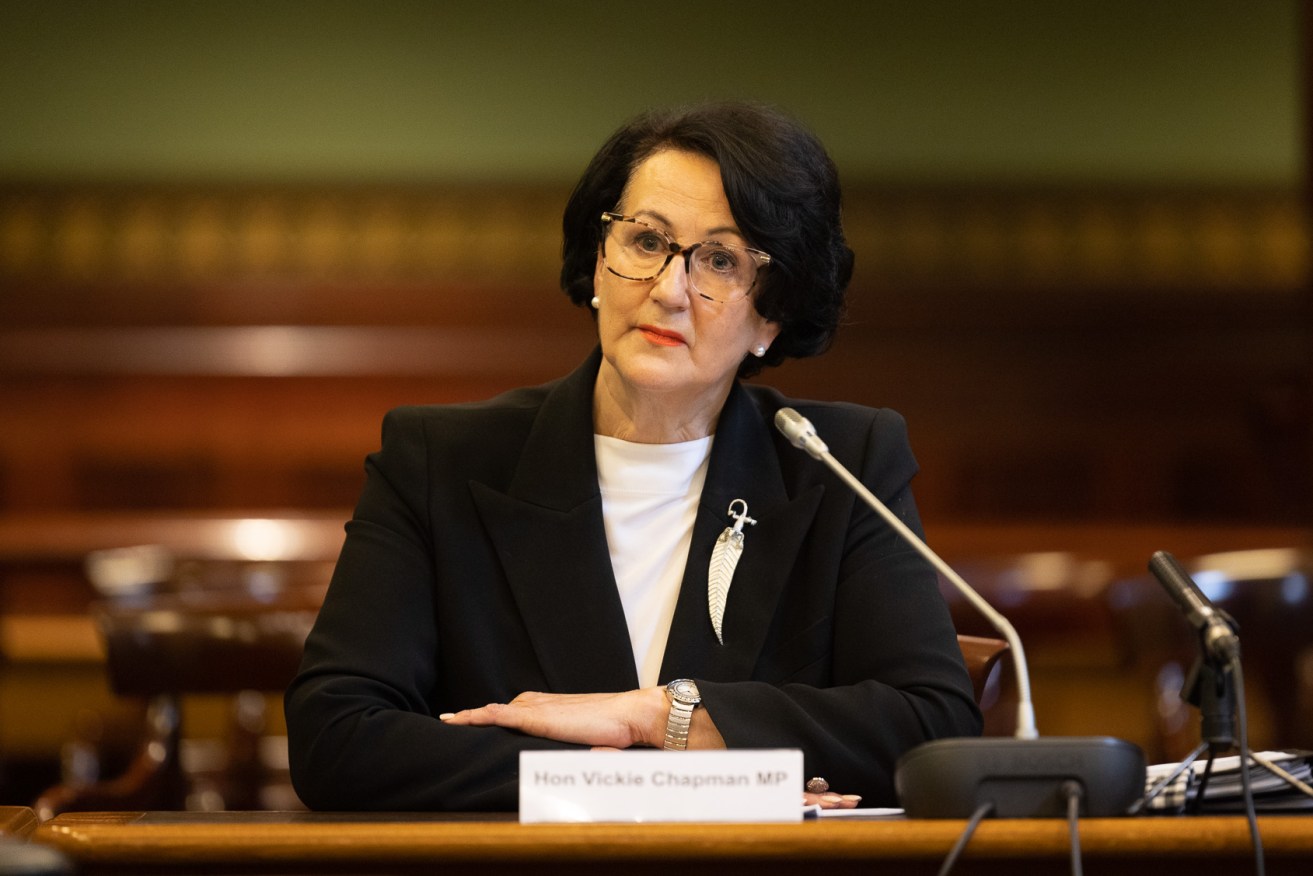
Deputy Premier, Attorney-General and Planning Minister Vickie Chapman faces the inquiry last week. Photo: Tony Lewis / InDaily
Namely, to look at all the objective facts – and insist they point to an entirely different conclusion than that which appears blindingly clear to almost everyone else.
For let’s be clear here: this isn’t some line-ball judgment call that requires two weeks of public hearings to reach a tenuous conclusion.
And it isn’t, as has been portrayed in some sections of the media, a ‘he said/she said’ political spat.
It is textbook.
It is, I’d suggest, about as clear a case of perceived conflict of interest as you are ever likely to encounter in public life.
The only mystery, indeed, from this inquiry will be what rationale its two Liberal members (and possibly, if our democracy is truly ruined, the one ex-Liberal crossbench member) may dream up to avoid saying as much in their final report to parliament.
That is, should they decide that nothing they’ve heard gives rise to any concern from their perspective.
That, of course, would be the Attorney’s saving grace – that, and the happy happenstance of living in South Australia, where much of the media class these days appears to understand or care for the conventions of parliament and government only slightly less than the Government itself. Which is to say, hardly at all.
Chapman herself has described the committee investigating her decision to axe a $40 million timber port proposal on her native home, where she owns property and mingles as a local, as a Labor “witch-hunt” – and, indeed, it is.
There’s no doubt that Labor is cynically exploiting the situation to inflict maximum damage on the Deputy Premier and, by extension, the Marshall Government.
But that’s only been possible because there is a situation to exploit.
Yet for Labor – the scent of political blood in their collective nostrils – sad as at it may be for them to admit, there is more at issue here than the immediate future of the Attorney-General’s career.
So let’s put that aside – for now.
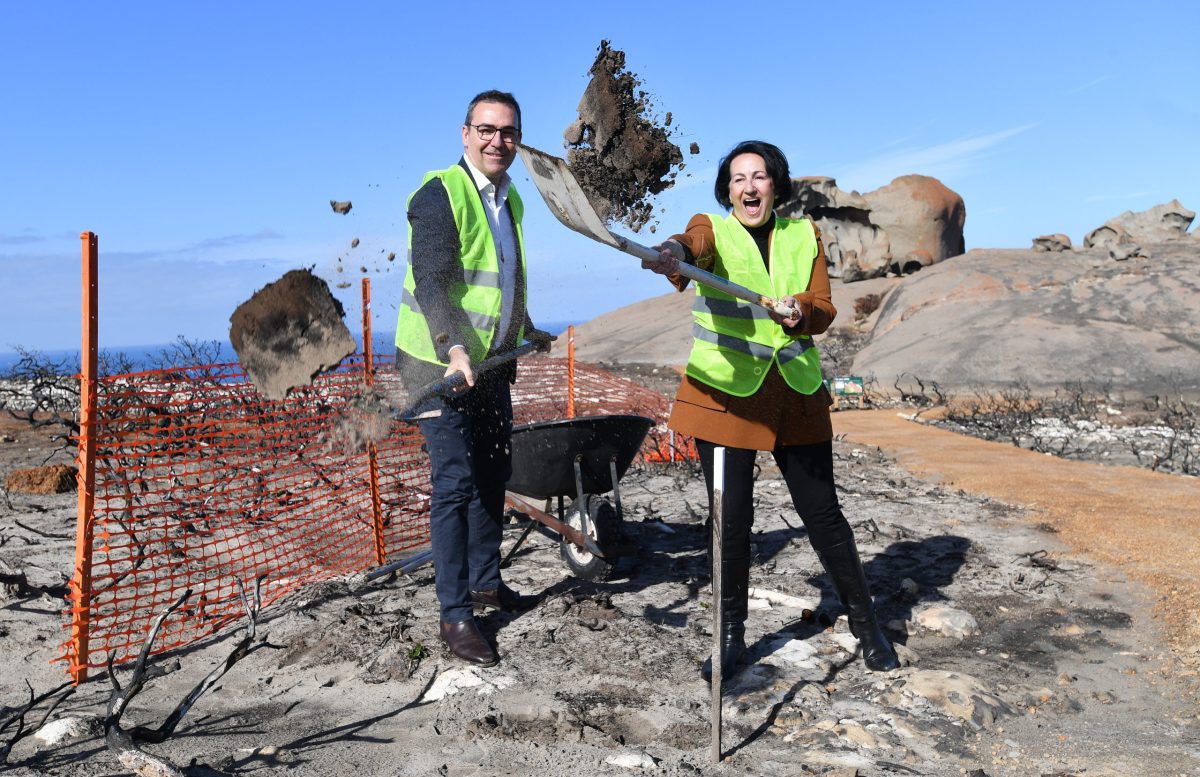
Vickie Chapman and Steven Marshall on Kangaroo Island last year. Photo: David Mariuz / AAP
Let’s put aside the fact that Chapman’s department prepared a document, at the request of her own office, for her to consider whether she should declare a conflict of interest – real or perceived – in determining the fate of the Smith Bay port project on Kangaroo Island. The island on which she grew up, and where her family owns significant property holdings – land, as it now turns out, adjacent one of the sites to be felled under the erstwhile Kangaroo Island Plantation Timbers’ now defunct-port plan.
Let’s put aside the fact Chapman now concedes property she inherited from her late father Ted, the area’s longtime MP – land from which her family derives some minor income via AirBnB – is within a kilometre or two of a proposed haulage route. While nonetheless insisting that this would have had no bearing on her decision in any case, because “trucks are trucks” and they are commonplace on the island regardless.
Let’s put aside testimony from John Sergeant, KIPT’s former director, who told parliament last week that as far back as 2017, when she was still in Opposition, Chapman turned up unannounced at a meeting with company executives and told them they had “picked the wrong location” for their port proposal, urging them to consider alternative sites.
Sergeant said in his testimony Chapman was at the time the “shadow minister for Planning, Transport and Infrastructure, I think”, but that was misremembered – she was never shadow minister for Planning. That was, at the time, David Pisoni.
And the island had no relevance to her responsibilities to her electorate, the safe inner-eastern Adelaide suburban seat of Bragg.
So the occasion was not particularly relevant to either her seat or her shadow ministerial responsibilities; if she had an interest or expertise in that meeting, to which she says she was invited by her then-parliamentary colleague and now KI mayor Michael Pengilly to meet the port’s proponents, it was because of her historical ties to the island.
Indeed, Pengilly tells us as much: one of the few pieces of information he yielded to the inquiry last week before theatrically storming off was that he had invited Chapman to the 2017 meeting with KIPT because she was “a landholder on the island”.
When pressed on this, he said: “Yes, is there something wrong with that? I don’t see anything unusual about that whatsoever.”
Chapman, mind you, denies Sergeant’s recollection of events – that she urged him to consider alternative sites such as Cape Dutton, which KIPT had already deemed unsuitable – instead claiming the company “told me [at that meeting] they were looking at a number of ports”.
That’s despite, mind you, KIPT having already purchased the Smith Bay site and earmarked it for the development.
But, as I say, let’s put all that aside.
For yes, Chapman’s actions are a matter for her, and for parliament, if the numbers permit it – but the system that allowed them to occur should also be under the microscope here.
When an Act gives a minister power over assets worth many hundreds of millions of dollars, that are owned by other people, the highest standards should apply
It’s a sad indictment on our systemic checks and balances that this inquiry is only going ahead because of the combination of ill-fortune and ineptitude that saw the Government’s majority steadily whittled down to less than zero – ineptitude exacerbated by the Liberal Party’s perpetual inability to sustain even the most basic of cordial working relationships with a crossbench that should be broadly ideologically predisposed to supporting it.
If not for all that, the same objective facts would have been already dismissed by the former Liberal Speaker Josh Teague, a push for broader examination would have died on the floor of parliament and the bizarre legislative scenario that allowed this to occur would have continued in perpetuity.
By the by, I asked Teague recently whether he was aware when he declared there to be no matter of privilege for misleading the House over the Attorney’s repeated assertions that neither she nor her family owned land near, or impacted by, the proposed development, that she did in fact own land near and impacted by the proposed development.
I asked him what information he sought and was provided to reach his conclusion, and whether he stood by his ruling.
He responded by referring me to his statement to the House in August declaring there was no matter of privilege.
I responded by asking the same questions again.
I am yet to receive a subsequent reply.

A timber plantation on Kangaroo Island. Photo: Sean McGowan
But as Sergeant told the inquiry: “When an Act gives a minister… power over assets worth many hundreds of millions of dollars, that are owned by other people, the highest standards should apply – and I don’t think they applied in this case.”
He added that the minister “may well have been perfectly within her rights to reserve the decision for herself”.
She certainly believes so.
But that’s the other problem.
Chapman herself appears to have taken a somewhat ‘Dennis Denuto’ approach to deciding whether a conflict existed: it’s the vibe
It’s not just that a single minister can make a judgment call on a major project after five years of submissions that is somewhat at odds with the recommendation of her department and independent planning commission.
It’s that the same minister can also decide for themselves whether or not they have a conflict of interest to declare – and if they don’t, apparently, there’s no mechanism to say otherwise.
That was certainly the understanding expressed by her various advisers and bureaucrats this week.
Chapman herself appears to have taken a somewhat ‘Dennis Denuto’ approach to deciding whether a conflict existed: it’s the vibe.
Or more specifically, she doesn’t accept that “being asked to make a decision on a proposal that had haulage routes within one to two kilometres of property [she] owned could create a perception of a conflict of interest”.
“I don’t, but I would have expected that if it did, somebody would have written to me about it,” she told parliament.
And, until Frank Pangallo suggested as much in parliament earlier this year, nobody did.
Which Chapman took as proof positive that KIPT was perfectly comfortable with a minister who had previously noted her opposition to their project going ahead in its proposed location subsequently deciding its fate.
Indeed, in dismissing concerns about a prospective conflict of interest in May, she glowingly quoted then-KIPT executive Shauna Black, who said at the time: “I don’t think the minister has made it clear that she opposes Smith Bay.”
“She has not said anything in public that would lead us to believe that she opposes Smith Bay. The minister is a smart woman, and she is a woman who understands the law. I don’t want to impugn her reputation here because I think that’s not fair.
“Obviously it’s common knowledge that Ms Chapman owns property here on Kangaroo Island. As such, you could be led to believe that she understands the politics of the island pretty closely. We have put our faith in a scientific assessment and a process, and we would hope that politics would not be playing a part.”
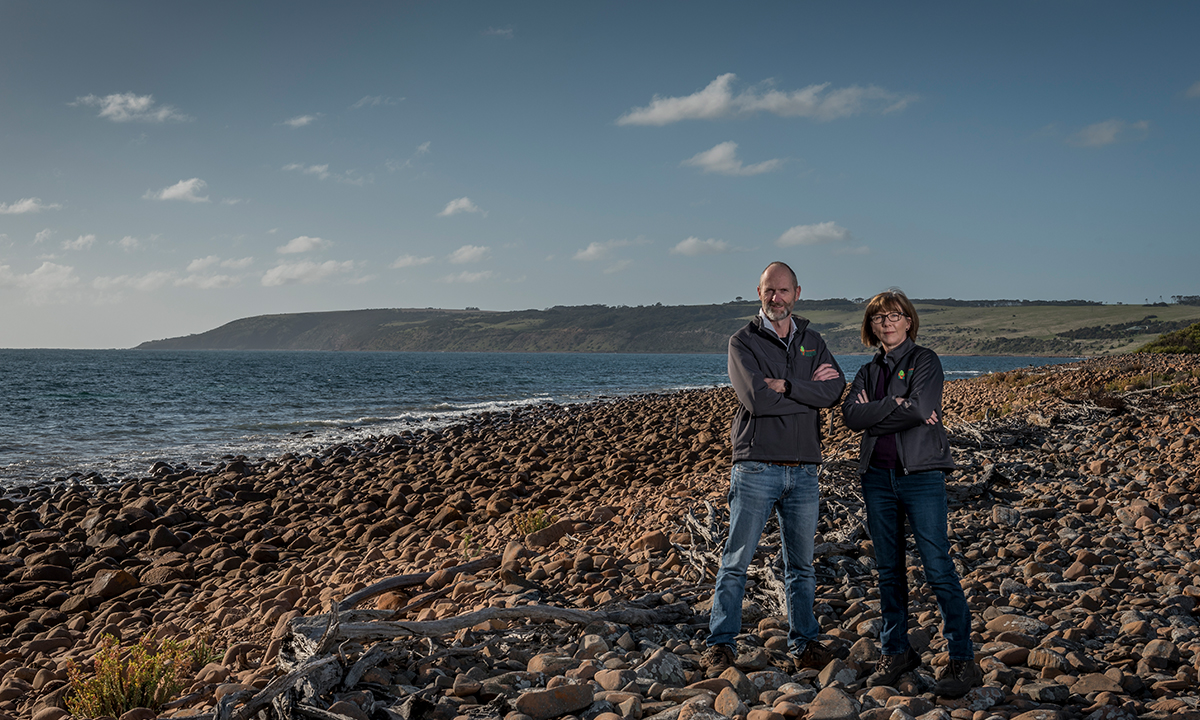
Former KIPT managing director Keith Lamb and executive Shauna Black on Kangaroo Island. Photo: Sean McGowan
Acknowledging Black’s comments, Chapman declared that she shared her “faith in the assessment process and I await the State Planning Commission’s report with interest”.
“If it stacks up, it will be approved – if it doesn’t, it won’t,” she added.
Or, as it turned out, it did – and it wasn’t.
For completeness – and given it was such an intrinsic part of Chapman’s original defence – let’s just note Black’s words to the committee this week: “I cannot see how a reasonable person could dispute that [Chapman] had, at the very least, a perceived conflict of interest.”
Minister Chapman belonged to a small cohort on the island who have conflated their long-held resentment of plantation forestry with the matter of the Smith Bay port
“I say this because of her landholdings, their proximity to the plantations, her close relationship with Mr Pengilly and also because of the numerous people from the island, the state, and wider Australia, who are convinced that she had a conflict,” she told parliament.
“But perhaps the greatest source of the perceived conflict is that both Mr Pengilly and Minister Chapman belonged to a small cohort of farmers on the island who have conflated their long-held resentment of plantation forestry with the matter of the Smith Bay port.
“It is ironic that the Smith Bay port would indeed have achieved the solution they sought: the removal of the trees.”
Why Black’s change of heart? Well, the rejection of the project, for one thing – of course.
But, according to Black, there was another reason: “I think I chose my words wisely [in her original statement] because the future of the company and the forestry industry on Kangaroo Island depended on Ms Chapman’s decision.”
Sergeant said something similar when I contacted him last week: “I don’t think the company’s silence or acceptance should be taken as anything, other than fear.”
“That’s not necessarily Vickie’s fault,” he added.
“That’s in the nature of the legislation.”
Of course, a company whose very existence depends on a decision by a sole individual is not going to declare that that individual is anything but impartial.
Chapman’s assertion that she didn’t declare a conflict because no-one asked her to is, to be frank, a ludicrous proposition.
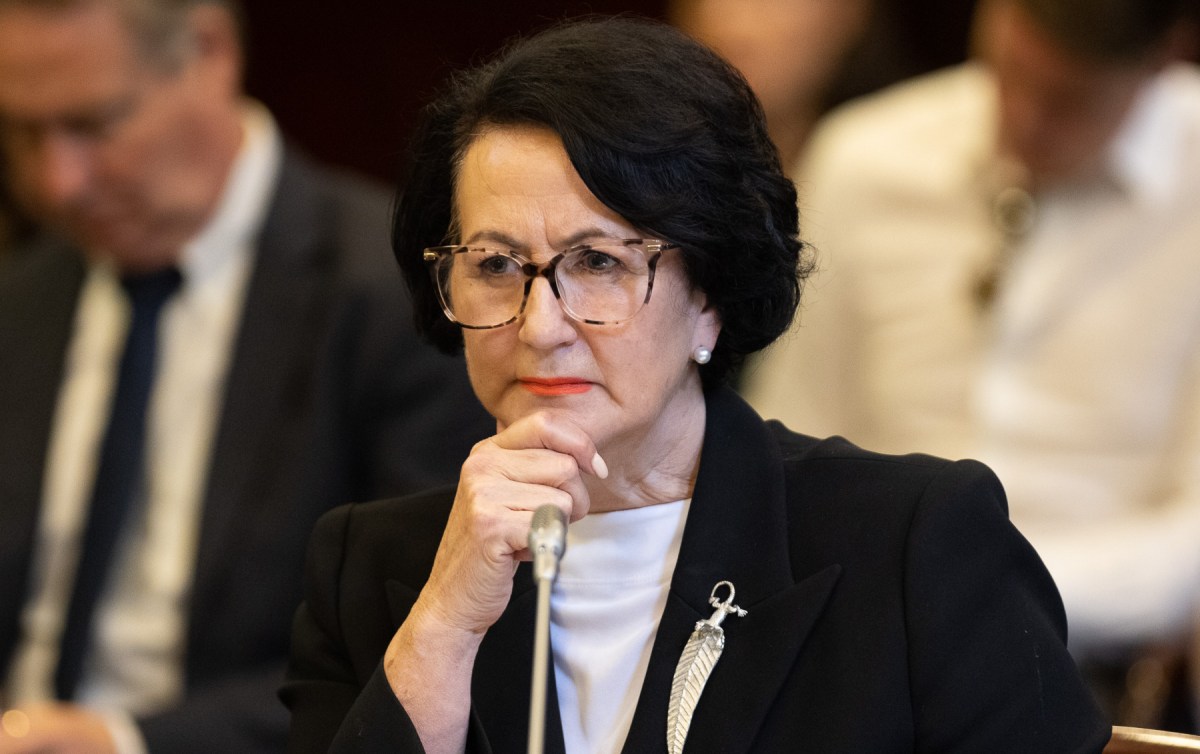
Chapman in parliament last week. Photo: Tony Lewis/InDaily
Moreover, she made it clear after vetoing the project – when Pangallo again claimed she should have recused herself from the process – that the decision as to whether she had a conflict, real or perceived, was hers alone.
“I’m completely satisfied that there’s no conflict of interest,” Chapman told reporters in August, suggesting it was a matter for individual ministers to declare.
“In this instance, I’m satisfied that there is no conflict of interest in relation to the Kangaroo Island decision,” she said.
“I’ve concluded the matter and the decision’s been published.”
This is, of course, a nonsense.
All of this doesn’t even touch upon the reputational harm our poor little state will have suffered from this shameful episode
The ministerial code of conduct – y’know, that document that former Planning boss Tony Braxton-Smith, bizarrely, somehow didn’t know existed – makes it clear that ministers “are under an obligation to advise the Premier in writing as soon as possible after becoming aware of any conflict of interest between their public duty and private interests”.
Chapman says she did not do this – despite conceding “an obligation [for ministers] to notify the Premier when they have any doubt as to whether there may or may not be a conflict” – because: “I don’t have any doubt.”
“Have I identified to him an area of which I considered there was a conflict or a perceived conflict? The answer to that is no, and nor has he asked me that, to the best of my recollection,” she told parliament last week.
Beyond that, then, the responsibility lies not with the minister – but the Premier himself, who must consider how a conflicting interest might “interfere with or affect the performance of the Minister’s public duty and how the public will perceive the propriety of the Minister’s continued participation in a matter” [my italics, btw].
Was this done? No-one seems to really recall.
Marshall’s own rhetoric this week hinged on ruling out any “bias” – he pointedly avoided the word ‘conflict’.
But if Chapman was unwilling to concede the clear perception of conflict – even after it had been publicly alleged – the Premier, or the Crown law officers in her department, should have been doing it for her.
That they either did not, or were ignored, is an abject failure of governance in this state.
As a fair and reasonable person myself, I’m calling it here: there’s a conflict
As a recent missive from SA’s ICAC to its tens of thousands of bureaucrats pointed out: “It is not solely a decision for [a] public officer whether a conflict of interest arises.”
“It is not enough for a public officer to regard themselves as not being influenced by their personal interest – a public officer has a conflict of interest when a ‘fair and reasonable’ person could perceive them as having one.”
As a fair and reasonable person myself, I’m calling it here: there’s a conflict.
Mind you, the ICAC no longer exists in the form it did when it sent that, so maybe such standards no longer exist either.
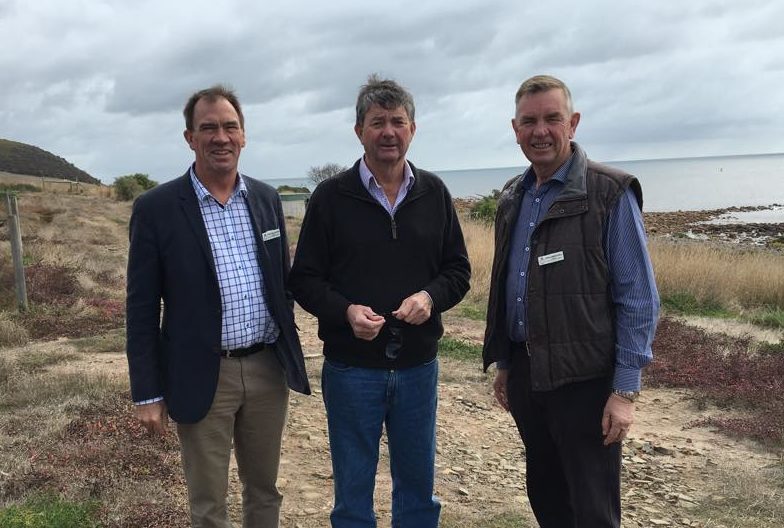
KI mayor Michael Pengilly (centre) at Smith Bay as an MP in 2017, with colleagues John Dawkins (right) and Peter Treloar, who is now a member of the committee examining the decision. Pengilly posted in a comment on the original photo: “At the proposed Port site which is obscene to even be considered. I smell a great big rat.”
And all of this doesn’t even touch upon the reputational harm our poor little state will have suffered from this shameful episode, in which a company submitted in good faith report after report in the assumption that a designated major project would be given the most assiduously forensic consideration – only to be knocked back by a sole trader after, according to evidence to the committee, an expected cabinet discussion was allegedly abandoned because one of the relevant ministers was away on leave.
And this, from a Government that was elected on a pledge to ‘back business to grow the economy’!
Still, it’ll probably play well on KI – lately a crucial part of the uber-marginal Labor-held seat of Mawson – where the port plan was never too popular in the first place.
Which in itself might have suggested the need for scrupulous transparency.
Even if this had gone to cabinet, in the normal order of things a minister with perceived conflicts such as Chapman’s should have recused themselves
And what of Chapman’s Liberal colleagues who, according to KIPT evidence, flagged their concerns and undertook to raise them with Marshall?
Well, Treasurer Rob Lucas tells us he has “lots of conversations with my parliamentary colleagues, including the Premier, about lots of different things [but] I don’t propose to ventilate them publicly”.
Moreover, he helpfully adds, “the decision in relation to Smith Bay was a decision for the Attorney-General alone, and no other Minister – myself included – had any authority in relation to this matter”.
In other words – it’s none of my business.
Which, when you think about it, is utterly bizarre.
Particularly since even if this had gone to cabinet, in the normal order of things a minister with perceived conflicts such as Chapman’s should conceivably have recused themselves from the broader deliberation – let alone taken a unilateral decision.
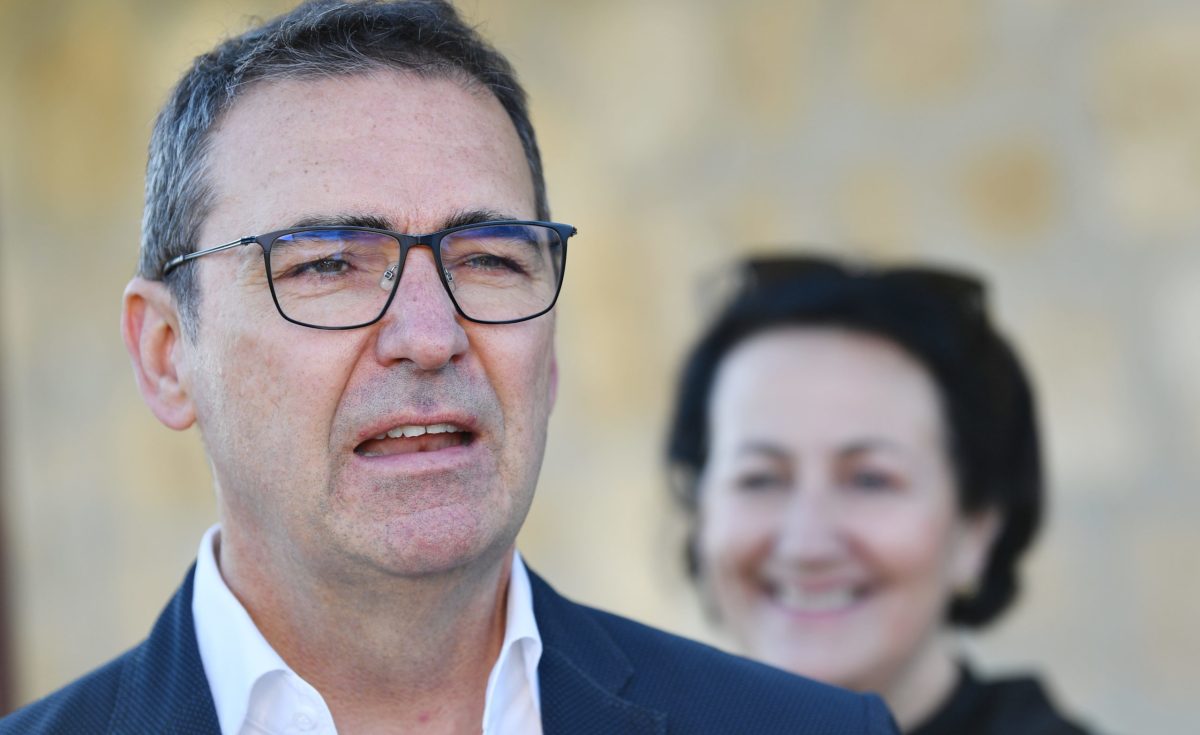
Premier Steven Marshall and his deputy Vickie Chapman pictured on Kangaroo Island last year. Photo: David Mariuz / AAP
So let’s just consider why it was that the fate of a $40 million project – that would have unlocked potentially billions of industry dollars and hundreds of jobs – was ultimately determined by the whim of one minister.
The Smith Bay proposal was declared a major project under the provisions of the state’s Development Act – which was superseded in 2016 by the Planning, Development and Infrastructure Act, under which (along with various Transitional Provisions) the matter was eventually determined.
The Act provides for no appeal against the ministerial decision.
You may recall the passage of that phone-book of a Bill was a fraught one, doggedly overseen by then Attorney-General John Rau.
I asked him why the legislation took the power to authorise major developments from being an act of the Governor under advice from Cabinet to being contingent on ministerial discretion alone.
The answer? He doesn’t really know.
He did tell me that “the reason for the Planning Commission being established was to provide an independent source of advice to the minister of the day” and the “expectation was that if the minister chose to ignore that advice, the minister should be called upon to explain why”.
But as to why the legislation ultimately narrowed, rather than broadened, the decision-making parameters?
“It was many years ago, and it was a very significant piece of legislation – which went between the Houses many times, and for a great length of time,” he says.
“I do not recall exactly where all of the bits and pieces – that ultimately ended up being the compromise that went through – all originated… I’m not ruling out that it was part of the original draft.
“But it wasn’t my intention to create a situation where there wasn’t some sort of oversight.”
I wonder whether the Labor members of the current committee will acknowledge the culpability of the legislation enacted under their watch in all this, and seek to safeguard against future follies?
Or are they just in it for the political scalp?
Because, after two weeks of hearings the central question remains the same as it did on day one of this inquiry.
And it ain’t whether or not this was a conflict of interest.
The question is: how could this have been allowed to happen?
Tom Richardson is a senior reporter at InDaily.




